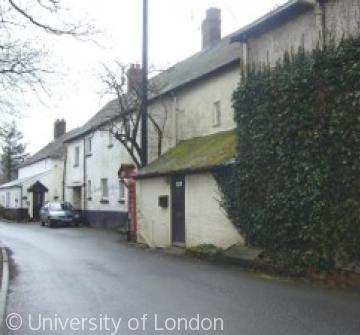Oldways End

Cottages at Oldways End, Brushford. Oldways or Allways End, like Exebridge, straggles two parishes and two counties. It grew up as a roadside settlement where four ancient routes meet at a staggered junction, giving the hamlet its names. The western side is in the East Anstey, Devon and the eastern is in Brushford, Somerset. Most dwellings are on the Somerset side where the name Oldways was preferred. In Devon Allways was often used. The cottages pictured above, which have their backs to the road, were the first in the hamlet on the Somerset side. In the 1840s they were two cottages belonging to Allshire farm. The settlement is said to have been created by the Blackmore family on land leased in 1835 from owner of Allshire farm. It comprised a smallholding, a carpentry shop and sawpit, shop, post office for East Anstey, a smithy and a Methodist chapel (1845). In 1841 there were two cottages in Somerset occupied by the families of Thomas Blackmore, millwright, who had two servants, and George Blackmore, wheelwright. In Devon there were three cottages on a smallholding called Twenty Acres occupied by two labouring families and a cooper. In total about 23 people. By 1901 there were 10 dwellings and about 40 people including two carpenters, two blacksmiths, a dressmaker, a washerwoman, railway, road and agricultural labourers, and a stone hauler, possibly working in the Anstey Field quarry. In the early 20th century a man made potato baskets. Many more houses have been built in the 20th century. The original post office had its entrance near the telephone box but a new shop building, extreme right was added in 1921 and entered from the north south road.
Content generated during research for the paperback book 'Exmoor: The making of an English Upland' (ISBN 13 : 978-1-86077-597-0 ) for the England's Past for Everyone series





